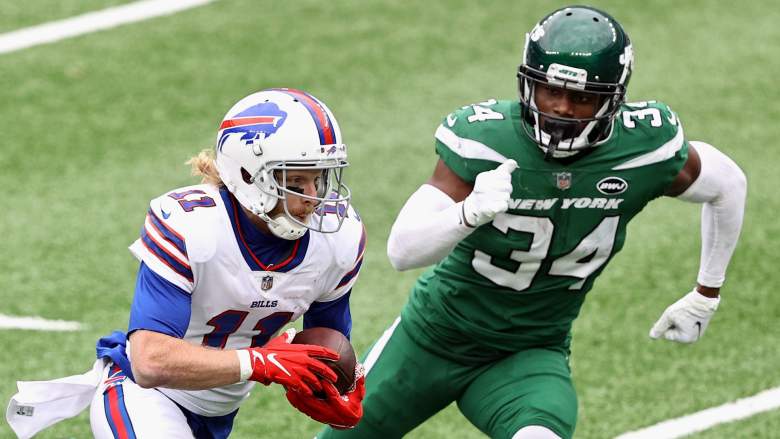
Getty Buffalo Bills Cole Beasley splits two New York Jets defenders
Cole Beasley enjoyed a career-best season in 2020, falling just short of 1,000 yards and making the first NFL All-Pro team of his career. But it may end up being his final season with the Buffalo Bills, with a new report suggesting that his offseason controversies and rise of new slot candidates could make Beasley a candidate to get cut before the season starts.
If the prediction were to come true, it could also mean a big opportunity for one of the Bills’ most versatile players, who could end up taking Beasley’s spot in the slot.
The latest Bills news straight to your inbox! Join the Heavy on Bills newsletter here!
Beasley’s Days With Buffalo May be Numbered
Jay Skurski of the Buffalo News took a look at Bills training camp and some of the surprising players who may not end up making the final roster. He noted that Beasley had already stirred some controversy when he suggested that he would rather retire than be forced to take the COVID-19 vaccine. In a viral and controversial statement shared on Twitter, Beasley said that he saw the shots as unnecessary.
“I’m not going to take meds for a leg that isn’t broken,” he wrote, via CNN. “I’d rather take my chances with Covid and build up my immunity that way. Eat better. Drink water. Exercise and do what I think is necessary to be a healthy individual. That is MY CHOICE based on MY experiences and what I think is best.”
“If I’m forced into retirement, so be it.”
Skurski noted that Beasley may end up following through on his threat to retire, but the Bills could also decide to save the money and cut him loose instead. Cutting Beasley would save $5.341 million against the cap in 2021, along with dead-money hits of $2 million and $1.5 million over the next two years, which Skurski said were “reasonable.”
Decisions on Slot Position
It’s not just Beasley’s controverisal stance on vaccines that could endanger his spot on the roster, Skurski noted. He pointed out that the Bills have grown very deep at slot receiver, and cutting Beasley could allow some younger players to step into his place. Beasley was plagued by injuries at the conclusion of last season, missing the season finale and playing hobbled throughout the playoffs.
Others have already suggested that there’s a better slot receiver already on the Bills roster. Doug Farrar of USA Today’s Touchdown Wire this week unveiled the ranking of the league’s top slot receivers, and a different Bills pass-catcher landed on the list instead of Beasley.
The site listed Isaish McKenzie as the ninth-best slot receiver in the NFL, noting that he looked better out of the slot despite getting fewer chances than Beasley.
“Like all great slot receivers, McKenzie has the ability to elude defenders with quick option and movement concepts in compressed areas, and there’s no more compressed area than the red zone,” Farrar noted. “That’s why McKenzie caught six touchdown passes on just 21 overall slot catches and 23 targets for 152 yards.”
If the Bills decide to go with the younger (and cheaper) McKenzie as the starting slot receiver, it could spell the end of Beasley’s time with the team.
READ NEXT: Analyst Predicts Monstrous Year for Bills’ Josh Allen, Makes New Prediction